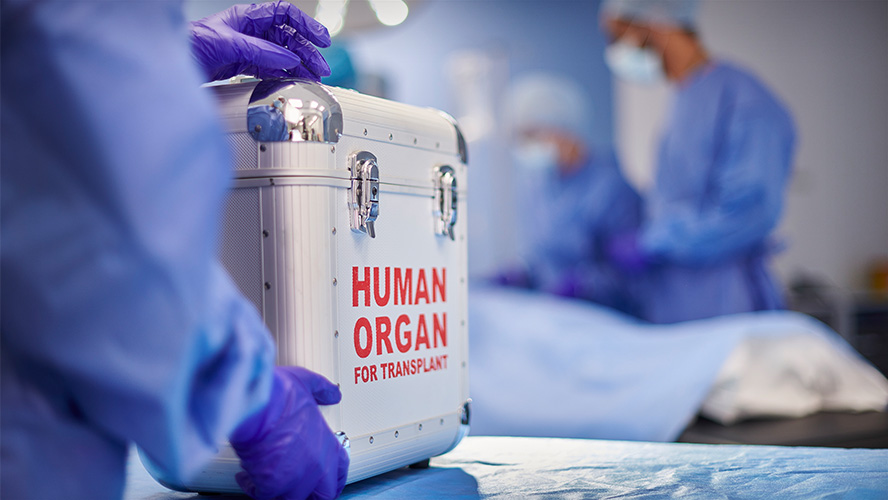
Advancements in lung and kidney transplantation are helping overcome one of the greatest challenges in organ donation: the shortage of viable donor organs.
Two new studies from UHN’s Ajmera Transplant Centre showcase innovative techniques that aim to expand the donor pool and improve access to life-saving transplants. These findings mark major steps forward in transplant medicine, offering hope to patients awaiting critical procedures.
A study led by Dr. Shaf Keshavjee, Senior Scientist and Chief of Innovation at UHN, evaluated the impact of ex vivo lung perfusion (EVLP) in the largest single-center study of EVLP outcomes to date. EVLP is a technique developed by Dr. Keshavjee and colleagues at UHN that enables donor lungs to be assessed and treated outside the body before transplant.
Having recently marked the 1,000th procedure of EVLP, the team conducted a retrospective study of the first 1,000 consecutive EVLP procedures performed at Toronto General Hospital between September 2008 and March 2024. They analyzed donor and recipient demographics, procedural characteristics, transplant rates, and post-transplant outcomes.
Of the 1,000 ex vivo lung perfusion procedures, approximately 65% of lungs were accepted for transplant. EVLP volume grew over time and contributed to an overall increase in transplantations, including the use of moderate- and high-risk donor lungs. Post-transplant outcomes, including intensive care unit duration and overall survival, did not differ significantly between EVLP and non-EVLP lungs.
Overall, these results show that EVLP is a safe and scalable approach that has expanded the donor pool, supported program growth, and set the stage for further innovation in lung transplantation
In another study focused on kidney transplantation and done in collaboration with SickKids Research Institute, researchers explored a novel method to extend the preservation time of donor kidneys—another promising approach to increasing organ availability. This study, co-led by Drs. Markus Selzner, Lisa Robinson, and Francisco Calderon Novoa, describes a new approach that could extend the viability of donor kidneys before transplant.
A shortage of donor organs continues to limit the number of kidney transplants performed worldwide. Typically, donor kidneys are cooled to 4°C prior to transplant and can be kept cold for up to 30 hours before the organ needs to be warmed and blood supply restored. Cooling a donor kidney below zero degrees Celsius without freezing (subzero preservation) could potentially expand organ sharing and even lead to organ banking.
In this study, the team tested a subzero preservation technique (subzero storage without freezing), designed to keep kidneys colder for longer without the damaging effects of freeze-thawing and ice crystal formation. Using research models, they compared kidneys stored for up to 48 hours using the subzero method against those kept in standard cold storage.
Results showed that kidney function and tissue health were comparable across all groups, and there were no signs of freeze-related injury. These findings provide evidence, for the first time in transplantation models, that subzero storage could be a safe and feasible way to extend organ preservation time. Future studies are needed to refine protocols further for improved outcomes.
Together, these studies show how technologies like EVLP and subzero kidney preservation can safely expand donor organ availability and improve access to life-saving transplants.
The Journal of Thoracic and Cardiovascular Surgery manuscript
Dr. Shaf Keshavjee is the first and corresponding author of the study. He is a Senior Scientist and Chief of Innovation at UHN. He is also a Professor of Thoracic Surgery and Biomedical Engineering, and Vice Chair for Innovation in the Department of Surgery the University of Toronto.
Dr. Shaf Keshavjee and several other co-authors are shareholders in Traferox Technologies Inc. Dr. Keshavjee serves as Chief Medical Officer and Chief Scientific Officer of the company. He and other co-authors also receive consulting fees from Lung Bioengineering and are listed as inventors on patents relevant to this work.
For a full account of competing interests, see the manuscript.
American Journal of Transplantation manuscript
Dr. Francisco Calderon Novoa is the first and corresponding author of the study. He is a Postdoctoral Researcher at UHN.
Dr. Markus Selzner is the co-senior author of the study. He is a Scientist at UHN and a Professor in the Department of Surgery at the University of Toronto.
Dr. Lisa Robinson is the co-senior author of the study. She is a Senior Scientist in the Cell and Systems Biology program at the SickKids Research Institute, Professor in the Departments of Paediatrics and Biochemistry, and Institute of Medical Science, and Dean of the Temerty Faculty of Medicine at the University of Toronto.
For a list of competing interests, please see the manuscripts.
These works were supported by UHN Foundation.
Keshavjee S, Sage AT, Borrillo T, Yeung JC, Piyasena D, Wakeam E, Donahoe L, Waddell TK, de Perrot M, Pierre A, Balachandran S, Ghany R, Ali A, Yasufuku K, Cypel M. One thousand cases of ex vivo lung perfusion for lung transplantation: A single-center experience. J Thorac Cardiovasc Surg. 2025 Sep 3:S0022-5223(25)00738-X. doi: 10.1016/j.jtcvs.2025.08.036. Epub ahead of print.
Calderon Novoa F, Chu TP, Lees K, Ganesh S, Martinez-Arenas L, Pollman N, Parmentier C, Kawamura M, Hobeika C, Ray S, Nogueira E, John R, Gupta A, Loizides P, Allen T, Reichman T, Robinson L, Selzner M. Kidney storage at subzero temperature is safe for porcine kidney autotransplantation: A world first in vivo study. Am J Transplant. 2025 Sep 9:S1600-6135(25)02947-8. doi: 10.1016/j.ajt.2025.08.033. Epub ahead of print.




